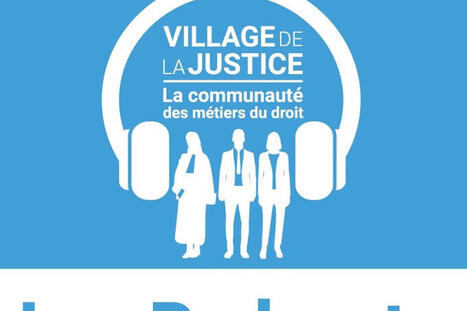 Your new post is loading...

|
Scooped by
Stéphane Cottin
July 10, 2025 1:10 PM
|
Recherche documentaire juridique : méthodologie - Édition 2025-2026 de Stéphane Cottin, Vincent De Briant, Audrey Zians, sur la librairie juridique Lgdj.fr

|
Scooped by
Stéphane Cottin
February 5, 5:11 AM
|
Découvrez comment l'approche LLM as a Judge permet d'évaluer l'IA par l'IA et ouvre la porte à des modèles plus fiables et dignes de confiance.

|
Scooped by
Stéphane Cottin
January 29, 9:53 AM
|
Circulaire NOR CPPB2601007C relative à la préparation des rapports annuels de performance (RAP) 2025

|
Scooped by
Stéphane Cottin
January 22, 6:43 AM
|
Laser, Christa and Goodman, Jordana and Frakes, Michael and Freilich, Janet and Lemley, Mark A. and Ouellette, Lisa Larrimore and Schwartz, David L. and Silbey, Jessica M. and Sukhatme, Neel U. and Vishnubhakat, Saurabh and Wasserman, Melissa F., Ten Tips for Legal Empiricists (December 05, 2025). Goodman & Laser, Ten Tips for Legal Empiricists, 23 N.W. J. Tech. & Intell. Prop. 227 (2025), Stanford Public Law Working Paper, Available at SSRN: https://ssrn.com/abstract=5875642 or http://dx.doi.org/10.2139/ssrn.5875642

|
Scooped by
Stéphane Cottin
January 22, 6:07 AM
|
In the past few years, large language models (LLMs) have achieved significant technical advances, such that legal-advocacy organizations are increasingly ado

|
Scooped by
Stéphane Cottin
January 8, 2:22 AM
|
This paper critically addresses the application of the Better Regulation principles within the European Union’s evolving legislative framework for the digital e

|
Scooped by
Stéphane Cottin
December 21, 2025 3:25 PM
|
Le podcasting ou comme le disent nos amis Québécois la balladodiffusion est une technique de diffusion d’un contenu sur Internet qui a émergé en 2004 grâce à l’avènement du web 2.0 [1]. Principalement utilisée par les médias, cette technique de diffusion d’information se généralise au point de devenir un véritable outil de communication facilement (...)

|
Scooped by
Stéphane Cottin
December 15, 2025 10:28 AM
|
This paper explores the integration of Artificial Intelligence (AI) in mergers and acquisitions (M&A) due diligence, examining the transformative effect on

|
Scooped by
Stéphane Cottin
December 14, 2025 3:36 PM
|

|
Scooped by
Stéphane Cottin
December 12, 2025 7:46 AM
|
Copyright © 2025 for the individual papers by the papers' authors. Copyright © 2025 for the volume as a collection by its editors. This volume and its papers are published under the Creative Commons License Attribution 4.0 International (CC BY 4.0).

|
Scooped by
Stéphane Cottin
December 11, 2025 2:10 AM
|
In the past few years, large language models (LLMs) have achieved significant technical advances, such that legal-advocacy organizations are increasingly ado

|
Scooped by
Stéphane Cottin
December 10, 2025 6:09 AM
|
Teaching constitutional law today has been impacted by two trends reflecting a polarized electorate and politics: first, recent restrictions targeting education

|
Scooped by
Stéphane Cottin
December 7, 2025 1:58 PM
|
|

|
Scooped by
Stéphane Cottin
February 10, 7:54 AM
|
Bonjour à tous, Retour sur le sujet de l'IA et du droit d'auteur. Dans le Chapitre 2 de mon ouvrage sur l'IA, j'ai divisé en deux grandes catégories les litiges relatifs au droit d'auteur en lien avec l'IA générative, selon qu'on se place en amont ou en aval de l'utilisation…

|
Scooped by
Stéphane Cottin
February 5, 5:10 AM
|
Accurate and consistent evaluation is crucial for decision-making across numerous fields, yet it remains a challenging task due to inherent subjectivity, variability, and scale. Large Language Models (LLMs) have achieved remarkable success across diverse domains, leading to the emergence of "LLM-as-a-Judge," where LLMs are employed as evaluators for complex tasks. With their ability to process diverse data types and provide scalable, cost-effective, and consistent assessments, LLMs present a compelling alternative to traditional expert-driven evaluations. However, ensuring the reliability of LLM-as-a-Judge systems remains a significant challenge that requires careful design and standardization. This paper provides a comprehensive survey of LLM-as-a-Judge, addressing the core question: How can reliable LLM-as-a-Judge systems be built? We explore strategies to enhance reliability, including improving consistency, mitigating biases, and adapting to diverse assessment scenarios. Additionally, we propose methodologies for evaluating the reliability of LLM-as-a-Judge systems, supported by a novel benchmark designed for this purpose. To advance the development and real-world deployment of LLM-as-a-Judge systems, we also discussed practical applications, challenges, and future directions. This survey serves as a foundational reference for researchers and practitioners in this rapidly evolving field.

|
Scooped by
Stéphane Cottin
January 23, 1:03 AM
|
This report outlines the foundational components necessary to develop EurLexGPT—a modular,
domain-specific AI-based system built on EU legislative data—to se

|
Scooped by
Stéphane Cottin
January 22, 6:09 AM
|
The landscape of legal education is undergoing a profound transformation, shaped by rapid advancements in technology, globalization, and shifting demands within

|
Scooped by
Stéphane Cottin
January 9, 2:12 AM
|
Publisher: Vilnius University Institute of Data Science and Digital Technologies, Journal: Informatica, Title: Ontology-Based Knowledge Graph Approach for Legal Queries, Authors: Vuong T. Pham, Dang V. Dung, Hung Q. Ngo, Binh Nguyen, Nhon V. Do, Ali Selamat, Hien D. Nguyen , Abstract: In the legal domain, ontologies organize legal concepts and their relationships, while knowledge graphs connect these concepts to specific entities in legal documents. This study proposes a solution for integrating ontology and knowledge graph, called Legal-Onto model, to construct a knowledge base of an intelligent retrieval system in the legal domain. The Legal-Onto model combines ontology as the conceptual layer and knowledge graphs as the implementation layer for representing the content of legal documents. This relational model is integrated with a structure of knowledge graph to identify relations between concepts and entities extracted from ontology in the determined domain. Moreover, this research addresses inherent challenges in semantic-based knowledge-driven search. The specific objective is to accurately extract relevant information from legal documents to respond to entered queries. The experimental results show that this method is more effective than state-of-the-art methods in natural language processing and large language models, which are without specific legal domain knowledge.

|
Scooped by
Stéphane Cottin
December 22, 2025 12:43 PM
|
Première décision de justice rendue en France dans une affaire impliquant des hallucinations de l’IA : le chercheur en droit Damien Charlotin analyse en avant-première ce cas inédit. Il rappelle une distinction essentielle pour les professionnels du droit : toutes les IA ne se valent pas.

|
Scooped by
Stéphane Cottin
December 19, 2025 3:11 AM
|
The rapid advance in the abilities and ubiquity of Large Language Model (LLM) artificial intelligence platforms has given rise to countless applications

|
Scooped by
Stéphane Cottin
December 15, 2025 1:18 AM
|
Polysemous legal vocabulary is both highly frequent and conceptually central in Legal English, yet its instructional treatment remains insufficiently developed.

|
Scooped by
Stéphane Cottin
December 14, 2025 11:57 AM
|
Episode 2 : « Justice et politique : l'impossible entente ». Invités : Dominique Perben (ancien garde des Sceaux et député, avocat) et Georges Bergougnous (ex-Directeur des affaires juridiques de l’Assemblée, ex-chef du service des affaires juridiques du Conseil constitutionnel, ex-membre du CSM et prof de Droit constitutionnel)

|
Scooped by
Stéphane Cottin
December 11, 2025 2:11 AM
|
“Bots” powered by artificial intelligence systems are enormously powerful and versatile. Trained bots can take on a wide variety of roles, speaking and actin

|
Scooped by
Stéphane Cottin
December 11, 2025 1:09 AM
|
This paper examines how the adoption of artificial intelligence (AI) technologies influences judicial performance in China. We use large language models to iden

|
Scooped by
Stéphane Cottin
December 7, 2025 2:43 PM
|

|
Scooped by
Stéphane Cottin
December 2, 2025 1:41 AM
|
Guide d'accès aux rapports, lois, règlements, statistiques des institutions officielles françaises
|





 Your new post is loading...
Your new post is loading...













